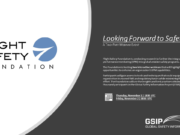Alexandria, VA, July 1, 2015 – The Flight Safety Foundation (FSF) announced today that it will hold an initial series of focus groups this month as part of a multi-year study concerning safety data collection and processing systems within two key regions: Asia-Pacific and Pan-America.
The first Asia-Pacific workshops will take place in Wellington, New Zealand (July 2); Sydney, Australia (July 6); Singapore (July 8); Hong Kong (July 10) and Tokyo, Japan (July 13). Pan-American focus groups are scheduled for Mexico City, Mexico (July 20-21) and Panama City, Panama (July 23-24). Additional dates and locations are available from the Flight Safety Foundation.
In addition, informational sessions aligned with regional aviation safety groups throughout the two key regions will be held to promote all aspects of the project. One was held in Medellin, Colombia on June 22-25, with a second planned for Lima, Peru on July 9-10.
The Global Safety Information Project (GSIP) is a first-of-its-kind effort that seeks information pertaining to safety data collection and processing from aviation industry stakeholders within the key regions.
“GSIP represents an initial strategic attempt to apply the best practices of knowledge management on the critical challenges of flight safety data,” FSF technical vice president Mark Millam said. “Current efforts, such as this month’s focus groups, are part of a preliminary discovery phase. They can serve as the building blocks for a future system in which all data pertinent to flight safety, regardless of the geographic location for collection, can be collated with similar types of information and formatted into useful intelligence.”
The key outcome from the focus groups will be to identify how many entities collect safety data, how the data is collected and processed and how the results of that data collection and processing are applied to promote aviation safety.
“As the number of flight safety statistics increases, improved collection of and access to data becomes more imperative; however there isn’t really a comprehensive knowledge management approach yet to correlate worldwide flight safety data,” Millam said.
The collection and analysis of safety information is a key component of the Federal Aviation Administration and the International Civil Aviation Organization global aviation safety plan. Funded through an FAA cooperative agreement, GSIP seeks to establish what types of safety information and data are captured by each of the key stakeholders within the two study regions and how this is managed to enhance aviation safety. Project activities will include the development of a globally focused toolkit to be used by states to develop and implement voluntary safety reporting programs that include protections against punitive action by regulatory agencies and/or employers, as allowed by the respective national law.
###
Flight Safety Foundation (www.flightsafety.org) is an independent, non-profit, international organization engaged in research, education, advocacy and publishing to improve aviation safety. The Foundation’s mission is to be the leading voice of safety for the global aerospace community.
Contact: Emily McGee, +1 703 739 6700, ext. 126; mcgee@flightsafety.org

